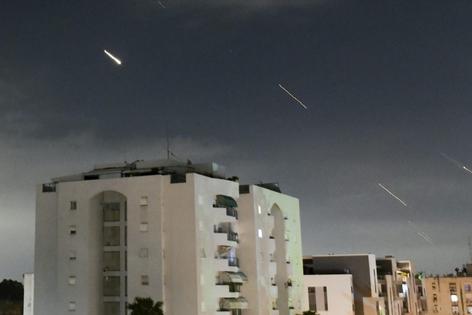Shadow war no more: Hostilities between Israel and Iran have strayed into direct warfare – is there any going back?
Published in Political News
For decades, Iran and Israel have been engaged in a “shadow war.”
Falling short of direct military confrontation, this conflict has been characterized by war through other means – through proxies, cyber attacks, economic sanctions and fiery rhetoric.
Events over the last few weeks in the Middle East have, however, changed the nature of this conflict. First, Israel – it is widely presumed – broke diplomatic norms by bombing an Iranian mission in Syria. The operation, in which 12 individuals were killed – including seven officials from Iran’s Islamic Revolutionary Guards Corp Quds Force – ratcheted up the stakes.
It also crossed a new threshold. Never before had that many Quds Force or other Iranian military officials been killed in a single attack by Iran’s adversaries. Almost immediately, rhetoric from leaders in Tehran indicated Iran would respond swiftly and dramatically.
Then, on April 13, 2024, Iran responded by crossing a line it had, to date, not crossed: launching a direct attack on Israeli soil.
Iran’s attack against Israel was also qualitatively and quantitatively different than anything Tehran had directly attempted before. Israel Defense Forces spokesperson Rear Admiral Daniel Hagari said that it consisted of at least 170 drones, 30 cruise missiles and 120 surface-to-surface missiles. The attack was launched from positions in Iran, Iraq, Syria and Yemen.
In physical terms, the barrage caused little damage. Hagari said that 99% of the projectiles sent by Iran were intercepted by air and missile defenses, and that only one person was injured. For now, it appears that Tehran is content with its own response; the Iranian Mission to the United Nations posted a message on social media following the attack indicating that the operation had concluded.
But as an expert on national security and the Middle East, I believe the Iranian attack was not about inflicting physical damage on Israel. It was more about Iran attempting to restore deterrence with Israel following the Damascus incident and showing strength to its domestic audience. In so doing, Tehran’s leaders are also conveying the message that should Israel conduct more aggressive actions against Iranian interests, they are willing to escalate.
Iran and Israel have been adversaries virtually since the Iranian Revolution in 1979, when the Shah of Iran fled the country to be replaced by a theocracy. New leader Ayatollah Ruhollah Khomeini broke the former regime’s ties with Israel and quickly adopted a strident anti-Israel agenda both in words and policy.
In the decades since, Israel and Iran have inflicted harm on the other’s interests in both the physical and virtual worlds. This has included major terrorist attacks backed by Iran against Israeli interests in Argentina in 1992 and 1994, Tehran’s backing of Hezbollah’s grinding insurgency against Israel in southern Lebanon, and the major operational support provided to Hamas that in part enabled the attacks on Oct. 7, 2023.
...continued











Comments